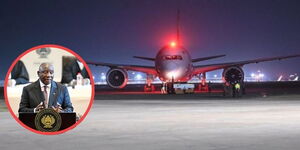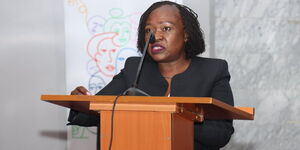Two families from Kitengela Kajiado County on Tuesday called for justice after their sons were killed during the anti-government protests.
The families while speaking to the press complained that the two bodies were listed as victims of road accidents however the pathologist revealed different findings.
According to Peter Ndegwa the government pathologist, the two died after being shot in the head during the protests.
Per the results, one of the victims was shot in the head with the bullet coming out of the other side resulting in his death. He was however booked at the morgue as a victim of a road accident.
"We do not have the means to bury him, I am the firstborn and our parents live in the village. We want justice," one of the relatives stated.
On the other hand, another family was also facing a similar dilemma after their kin was also booked as a road accident victim well in fact he was also shot during protests last week.
According to the father of the deceased, his son was killed for exercising his constitutional right. He demanded that all those involved in the incident should face the law.
These families were among others who were crying for justice after their families were murdered, and injured while others are still missing after the onset of the anti-government protests.
Protests are ongoing in the country as young Kenyans demand for change in governance. Kenyans planned demonstrations today and they are expected to continue on Thursday.
As protests continue, human rights groups have called upon the police to avoid using force while dealing with protestors in the streets. The groups also called for justice and accountability from all officers accused of injuring or harming protestors.
On July 1, the Kenya National Commission on Huma Rights (KNCHR) revealed that at least 39 people died and 361 others were injured during the protests between June 18 to July 1.
"The Commission continues to condemn in the strongest terms possible the unwarranted violence and force that was inflicted on protesters, medical personnel, lawyers, journalists, and on safe spaces such as churches, medical emergency centres and ambulances," read part of the statement from the commission.












